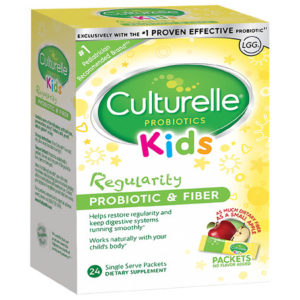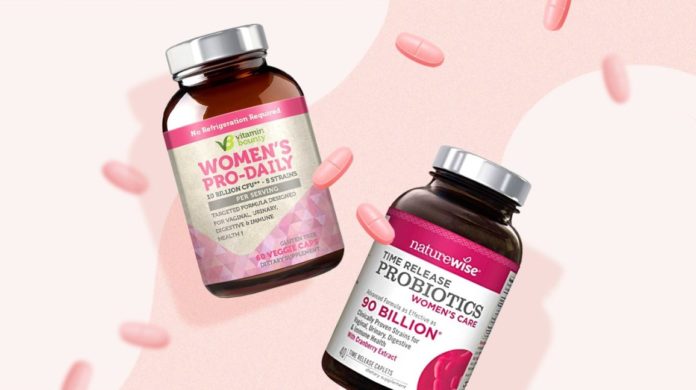The World Health Organization (WHO) defines probiotics as live microorganisms that, “when administered in adequate amounts, confer a health benefit on the host.” In simple terms, probiotics are nothing but yeasts and live bacteria which are good for health, especially the digestive system. Even though some might consider these bacteria as germs, note that the human body is full of good and bad bacteria. Probiotics are the good or helpful ones that help in keeping our gut healthy.
Probiotic-fortified foods, fermented dairy products, and other fermented foods are made of live probiotic cultures. Products that contain lactic acid bacteria include pickled vegetables, pao cai, kimchi, sauerkraut, tempeh, soy sauce, miso and dairy products such as yogurt, kefir,[26] and buttermilk.
Navigate
Probiotics for Women
Our bodies contain good and bad bacteria both; and of this probiotics are the good ones. There are various traditional probiotic foods like miso, natto, kimchi, sauerkraut and tempeh that have been restoring health for generations with their rich cultural heritages and medicinal benefits.
There is a common belief that our intestinal functions are limited to purposes of absorption and digestion of food. However, a healthy GI tract is associated with the overall well being of a human body.
There is no greater ally towards a women’s health other than probiotics. Beneficial microbes present in probiotics helps in metabolising and recycling hormones, including estrogen, phytoestrogens and thyroid hormones leading to a proper hormonal balance.
We have listed the 5 top reasons why one should take probiotic supplements daily –
The disadvantage of our current lifestyle
Our body is at a disadvantage when we are living in the modern, fast-paced culture with a busy schedule. Our western diets containing high sugar, fatty meat, artificial colors, and GMO’s are enough reason for the health issues we encounter these days. Using probiotics in such lifestyle gives the bad flora in our body the advantage in the fight for your health. It is quite possible that some might not even know what they are missing, but there is always a feeling that something is not right. Especially if are sick or prescribed antibiotics, it is essential to replenish the body’s system with good bacteria. This helps in maintaining a healthy balance. Following is the indication that your body needs a probiotic supplement:
- GI sensitivity diarrhoea/constipation
- Yeast infections, thrush, cold sores, rashes
- Bloating, IBS or partially-digested stools
- Headaches, migraines, joint aches
Vitamin deficiency
Vitamins and minerals are essential supplements for your life. The micronutrients present in them helps in carrying out the chemical reactions needed for good physical and mental health. The human body hosts organisms that produce vitamins; more specifically, they are present in our gut. Our gut contains with trillions of bacteria, especially in our GI tract, of which some of them produces B vitamins like Biotin, Folate and vitamin B12. This is the trio involved in nerve function and energy metabolism. People who are vegetarians and vegans are at risk of B12 deficiency as animal products are rich in B12.
Moreover, gut bacteria also produce vitamin K which your body needs for clotting and without it, there is a risk of bleeding to death when you have a menstrual cycle or get injured. Vitamin K is of two types – vitamin K1 and vitamin K2. You will not find K2 easily in food but is very important for the prevention of coronary artery disease and bone health. It is available in egg yolks, cheese, and fermented foods. Probiotic bacteria that are gut-friendly helps in making vitamin K2 which you may not get it from your diet. Probiotics also help in processing various nutrients like –
- fats
- copper
- magnesium
- carbohydrates
- milk
- proteins
- calcium
- iron
- cholesterol
- sugars
Wearing down of your digestive system
A mother provides with different with essential bacteria at the time of the birth of her kid. Studies show that if a child is born vaginally and os breastfed, then he/she also has enough good bacteria to start life with healthy gut flora. But for those kids who were born by c-section, it is possible that the gut flora was less diverse, which puts them at a higher risk of developing digestive issues.
Gut flora helps in powering the digestive system, and at the time you were born your digestive system was at full strength because of the right amount of gut flora. Now, imagine the same gut flora after more than 30 years years of life. There are possibilities that now your digestive system is not at its peak performance. But there are practical ways to resolve this and recharge your gut flora. First, add probiotic-rich foods in your daily diet and if it is hard to find, take a daily probiotic supplement.
Too much dependency on Antibiotics
There is a high possibility that you might have taken, at some point in your life, prescription antibiotic more than necessary. Eating antibiotics that kill any infection also kills off the good bacteria in the human body along with having long term effects, if left untreated. Research and clinical studies show that well-balanced gut flora links to overall health and well being.
The health of your vagina and hormonal balance
Just like an intestinal tract, our vagina is microbiome balanced finely. Probiotics which contains beneficial microbes help in keeping our vaginal area acidic, which makes that area difficult for harmful bacteria to survive. Many factors can throw out healthy vaginal flora such as spermicides, antibiotics, and birth control pills. Moreover, probiotics help with microflora balance to support vaginal health. Beneficial flora metabolises and recycles hormones, including thyroid hormones, estrogen, and phytoestrogens, which can help in offsetting symptoms of PMS, Menopause, and Perimenopause. In conclusion, they help in maintaining proper hormonal balance and protect bone and breast health as well.
Probiotics For Kids

- Probiotic Gummies
Similar to gummy candy or snack, this tasty probiotic is ideal for children. However, one concern point for it is the sugar content and artificial flavours. A study suggests using this kind of probiotics for kids older than three years.
- Chewables Powder Tablets
These are chewable powder tablets which have less artificial ingredients and sugar. Kids of 2 years of age or older can eat them.
- Easy-to-swallow pearls
Study shows that probiotics for kids are more effective and efficient when they are swallowed instead of chewed. Small pearl-like probiotic supplements are more comfortable for kids to take for this reason. Pearl probiotic supplements are ideal for children four years or older.
- Liquids probiotic supplements
To consume this, pour the required dosage in a spoon or glass. They can also be in the form of drops mixed in a glass of in water or directly squeezed into the child’s mouth to swallow. It is ideal for babies or infants up to 2-3 years old.
- Probiotic Melts
This is like candies that dissolve quickly in your child’s mouth and are usually in the form of flavored sticks or cubes. They are ideal for children of 3 years and older.
- Probiotic food options
It is effortless and convenient to add probiotic food in your kid’s meal. Most common probiotic foods are yogurt, pickles, cheese, and buttermilk. One thing to remember always is to look for the number of live cultures or CFUs. This is because not all food options can be as beneficial as probiotic supplements.
Key Factors to Consider Before Buying Probiotics
One should always look at a few core factors in the ingredients and strains before buying probiotics as this can affect the kid’s overall health. Before picking a probiotic, consider the following factors –
- Ingredients – Each probiotic for kids includes different probiotic strains and ingredients, so be sure to research each for your child’s safety. Some probiotics for kids contain dairy, gluten and other common allergens, and some include sugar and artificial colors. Select a probiotic supplement which is sugar-free and without any fillers.
- Number of CFUs – Colony-forming units (CFUs), or the amount of bacteria bodies measures the probiotics. According to the American Family Physician, it is ideal for kids to take 5 to 10 billion CFUs a day as it leads to a healthy digestive system and immune, and probiotics are good if they have at least 1 billion CFUs per serving. Usually, gummy or tablet probiotics contain at least 3 to 5 billion per serving and can help to reach the recommended daily intake.
- Recommendations by a paediatrician – Before buying probiotics, it is essential to talk to your paediatrician about what is suitable and best probiotic for children. Factors to be kept in mind are your child’s diet, any digestive or immune system changes, and allergens. Also, ask about probiotics that contain prebiotics to stimulate good bacteria. Even though probiotics are good bacteria, it is also essential to determine whether they are required for your child’s health specifically.
Probiotics for Kids – The Pros and Cons
People see the term ‘probiotics’ on every blog relating to healthy foods, healthy living and anything on new healthy diets. It has been used by many households to regulate digestive systems and related problems. Also, dieticians encourage consumption of probiotics as it helps in cleaning out the body system. This is one of the main factors that many companies claim that probiotics can help with weight loss, immune system support, energy levels and digestive health.
Parents also give probiotic foods to their children to help them grow healthier but note that the effect of probiotics vary from person to person and might not be same for all children, which why it is important to consult your doctor before buying a specific probiotic.
“Probiotics are useful for keeping your digestive tract healthy,” said Geisinger paediatrician Dr Maria Samonte. “But it’s important to be informed about which probiotics you give to your child—they may not work the same way they do with adults.”
Probiotics are good bacteria – “Your body is home to billions of organisms like bacteria, fungi and yeasts,” said Dr Samonte. “Most of these organisms are harmless, and many help your body work properly. They form what experts call the human microbiome.”
Eating probiotics through food products help in refilling your kid’s body with “good bacteria”, which in turn helps with immune system function, digestion and may even help in treating or preventing certain diseases.
Probiotics are especially helpful for problems like constipation or diarrhoea, both of which are very common in kids. They also help in curing the symptoms of inflammatory bowel disease and irritable bowel syndrome as well.
Also, children already on antibiotics get the benefits of probiotics as well. As antibiotics can cause side effects like constipation, stomach pain, or diarrhoea, taking probiotics helps in easing these side effects.
Benefits Of Probiotics
The vital thing that probiotic does it that it affects the nerves controlling the movement of the gut/ However, research is still going to find out which probiotics are best for specific health problems.
Common conditions that probiotics help with are:
- Inflammatory bowel disease (IBD)
- Irritable bowel syndrome
- Infectious diarrhoea (caused by viruses, bacteria, or parasites)
- Diarrhoea caused by antibiotics
Research also shows that they are useful for curing problems in various other parts of the body as well. This includes issues with:
- Urinary and vaginal health
- Skin conditions, like eczema
- Oral health
- Preventing allergies and colds
Probiotic Types
There are mainly two bacteria groups to classify probiotic.
- Lactobacillus –
Being the most common of all, one can find this in yogurt and various other fermented foods. Strains of this can aid in curing diarrhea and also those who have a problem in digesting lactose.
- Bifidobacterium –
This is found in dairy products and helps in easing symptoms related to irritable bowel syndrome and other conditions as well.
- Saccharomyces boulardii –
This is a yeast that is found in probiotics and helps in curing diarrhea and other digestive problems.
Conclusion
Probiotics is an essential component you must consume for a healthy lifestyle. It supports both kids and adults to maintain a balanced lifestyle avoiding health issues like Immuno Bowel Syndrome (IBS), diarrhea. It also improves vaginal health and hormonal balance in women. When given to kids, probiotics protect children from health problems such as cold and allergies.










